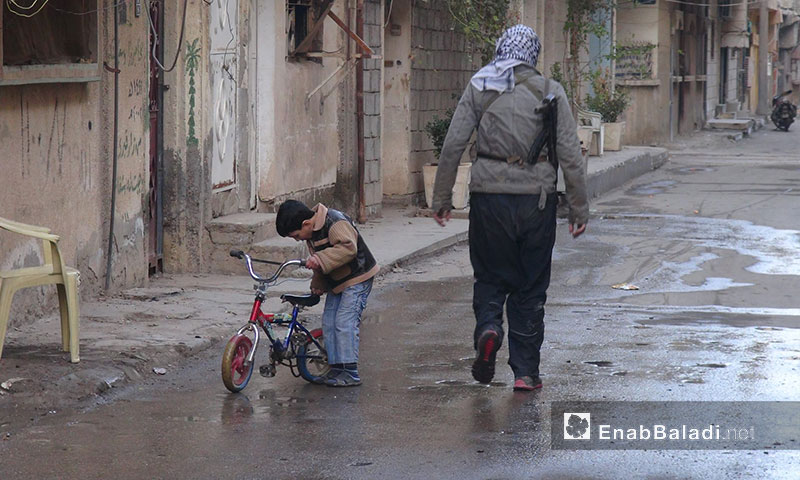Abu Muayyed, a 50 years old man living in the city of Deir ez-Zor until now, described to Enab Baladi the conditions of most of the ISIS-held areas in the governorate saying that “our life is like a game with ever-changing rules which depend on legislations of leaders, who are here the members and princes of ISIS.”
Whoever is following the moves of ISIS members in Deir ez-Zor today will clearly notice the state of confusion it is going through and its decisions that directly affect the citizens of the governorate, amid its defeats in Syria and Iraq.
The changes Abu Muayyed is referring to may occur in few days or one week, as he described. These changes will influence the decisions of entering and leaving the city and perhaps tightening or loosening the implementation of dress code and public appearance. Even relationships between the members of the organization will be affected.
State of Confusion
According to Abu Muayyad, citizens have been accustomed to the organization’s strict, conclusive and calculated orders which seem now to be unprecedented and at random. He asserts that the continuation of ISIS practices “such as imprisonment, crucifixion and killing no longer affect citizens,” and adds that “perhaps everybody started realizing that its end is coming.”
ISIS approach of laws enactment and legislations was influenced by current events and developments on the ground, which reduced the area of its control following consecutive losses. Actually, it was recently excluded from the entire governorate of Aleppo and besieged in the city of Raqqa, following battles against the “Syrian Democratic Forces” (QSD).
According to Omar al-Hassan, a 32 years old man displaced from Deir ez-Zor, “the power of ISIS comes from of its ability and effectiveness on the field, in addition to people’s attitudes towards it.” The young man compares between the previous period of the growing strength of the organization and the current period of its decline.
Al-Hassan argues that ISIS had previously relied on spreading rumors before issuing a decision. He clarifies also that “rumors would act as a test balloon that is meant to identify people’s reactions and then ISIS moves on to spreading this decision through the use of posters, Hesba ‘cars’ and leaflets. That is when it becomes binding and people get accustomed to it.”
The long lasting state of fear that ISIS managed to impose within the areas of its control contributed to the implementation of its decisions. The young man believes that this fear started to disappear and “ISIS’s loss began first in Ayn al-Arab (Kobani) to continue today in Mosul and Raqqa.”
In a poll carried out by Enab Baladi, some of Deir ez-Zor’s citizens state that the loss of trust among the members of ISIS affected its decisions.
Loss of Confidence
Abu Tayib, a 40 years old man and the resident of a village situated in the eastern countryside of Deir ez-Zor, believes that the justifications presented by the leadership and the legislators of ISIS did not succeed in persuading many of its members and supporters with all the decisions issued during the current period, at both the military and civil levels.
Abu Tayib affirms to Enab Baladi that “many ISIS members are beginning to complain about the strategy of its battles which seems to be lacking the compass of direction, stability and clarity, contrary to the early stages of the establishment and expansion of ISIS.”
What strengthens the hypothesis of the 40 years old man is the implementation of the penalty for some irregularities at a specific time while turning a blind eye other times on others, in addition to the military decisions that move ISIS members between the fronts in Iraq and Syria.
Abu Tayib, who describes the situation as “bad,” stated that what is happening affects the citizens “who have nothing to do with this.” Another witness, who refused to reveal his name, affirmed that this is due to the grudge that citizens are holding against the displaced people, “especially the Iraqi who took advantage of ISIS power and authority to deal with people with superiority and to raise the prices of goods and materials.”
Activists from Deir ez-Zor said to Enab Baladi that the struggles of the authorities have affected the behavior of many citizens who base their decisions on the field situation, mainly bombing, the scarcity of resources, the loss of raw materials and the destruction of infrastructure.

